(2020年整理)外研版初中英语知识点汇总.doc
外研版初中英语重点词汇

外研版初中英语重点词汇以下是外研版初中英语的部分重点词汇:1. what (疑问词) 什么2. is (be动词) 是3. this (代词) 这4. your (代词) 你的5. brother (名词) 兄弟6. mother (名词) 母亲7. father (名词) 父亲8. those (代词) 那些9. they (代词) 他们10. them (代词宾格) 他们11. themselves (反身代词) 他们自己12. our (代词) 我们的13. we (代词主格) 我们14. us (代词宾格) 我们15. ourselves (反身代词) 我们自己16. she (代词主格) 她17. her (代词宾格) 她18. herself (反身代词) 她自己19. he (代词主格) 他20. him (代词宾格) 他21. himself (反身代词) 他自己22. it (代词) 它23. its (物主代词) 它的24. itself (反身代词) 它自己25. they’re = they are 他们是26. I’m = I am 我是27. she’s = she is 她是28. it’s = it is 它是29. isn = is not 不是30. who’s = who is 是谁31. that’s = that is 那是32. what’s = what is 是什么33. isn’t = is not 不是34. don’t = do not 不35. doesn = do not 的单数第三人称形式36. let’s = let us 让我们37. won’t = will no t 将不38. hasn = has not 还没有39. hasn’t = has not 没有40. hasn’t been = hasn’t been to 还没有去过某地41. hasn’t seen = hasn’t seen sb / sth 还没有看见某人/某物42. hasn’t done = hasn’t done sth 还没有做某事。
(完整word版)外研版九年级英语上册语法知识点汇总.docx
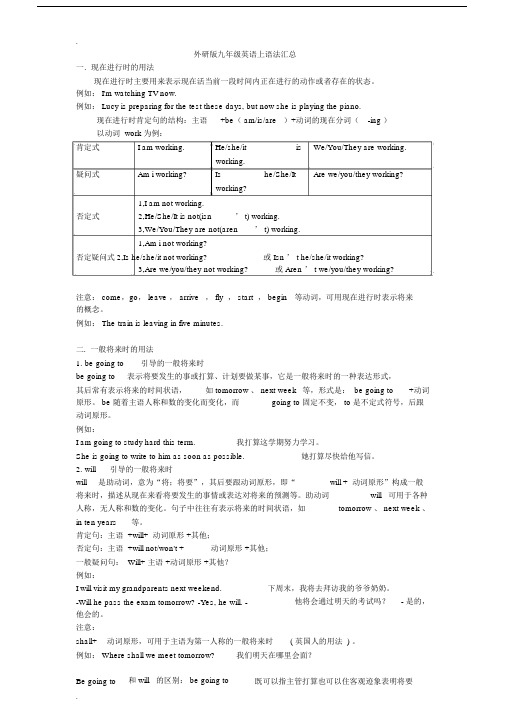
.外研版九年级英语上语法汇总一.现在进行时的用法现在进行时主要用来表示现在活当前一段时间内正在进行的动作或者存在的状态。
例如: I'm watching TV now.例如: Lucy is preparing for the test these days, but now she is playing the piano.现在进行时肯定句的结构:主语+be( am/is/are)+动词的现在分词(-ing )以动词 work 为例:肯定式I am working.He/she/it is We/You/They are working.working.疑问式Am i working?Is he/She/It Are we/you/they working?working?1,I am not working.否定式2,He/She/It is not(isn’ t) working.3,We/You/They are not(aren’ t) working.1,Am i not working?否定疑问式2,Is he/she/it not working?或 Isn ’ t he/she/it working?3,Are we/you/they not working?或 Aren ’ t we/you/they working?注意: come,go, leave , arrive, fly, start , begin等动词,可用现在进行时表示将来的概念。
例如: The train is leaving in five minutes.二. 一般将来时的用法1. be going to引导的一般将来时be going to表示将要发生的事或打算、计划要做某事,它是一般将来时的一种表达形式,其后常有表示将来的时间状语,如 tomorrow 、 next week等,形式是: be going to+动词原形。
七年级英语外研版知识点

七年级英语外研版知识点作为初中英语学习的关键年级,七年级英语外研版知识点是学生必须掌握的基础知识。
以下是七年级英语外研版知识点的详细分析。
一、基础语法在学习英语语法时,七年级学生需要掌握以下几个方面的内容:1. 名词:单数名词、复数名词、不可数名词和所有格的用法和变化规则。
2. 形容词:形容词的基本用法和比较级、最高级等形容词级别的用法和变化规则。
3. 动词:动词的基本用法和时态、人称以及情态动词的用法和变化规则。
4. 介词:常用介词的用法和相关的搭配或短语。
5. 代词:人称代词、物主代词、反身代词以及其他代词的用法和变化规则。
二、词汇对于七年级学生而言,词汇量和词汇稳固度是非常重要的。
以下是几类学生必须掌握的词汇:1. 一些基本的常用英语单词:如颜色、数字、字母等等。
2. 学校生活相关的单词:教育机构、课程安排、学生指导等。
3. 旅游和日常生活相关的单词:公共交通手段、购物、餐饮等。
4. 情感词汇:如表示喜爱、悲伤、愤怒、害怕等情感的单词。
三、阅读理解七年级学生需要具备以下能力来提高阅读理解水平:1. 建立阅读技能,如辨认字母和单词、理解句子和段落结构等。
2. 学会找出文章的主题、主旨和作者的意图。
3. 发掘文章中的常见语法结构、词汇和惯用短语。
4. 提高记忆和理解能力,识别文章中的关键信息,并在有需要时进行引用或总结。
四、口语表达除了语法、词汇和理解之外,口语能力也是七年级学生需要努力培养的技能。
以下是几个建议:1. 尽可能多地使用英语进行口语交流,例如在课堂上、家庭聚会上、朋友间等。
2. 集中注意力,听取、解析和回答问题。
3. 学习一些常用的口语表达和惯用语。
4. 练习发音,在自然的生活情境下大声读出音标和单词。
五、写作能力最后,七年级学生还需要培养写作能力。
以下是几个技巧:1. 先查看文章要求和提示,构思好文章结构。
2. 提高写作流畅性和连贯性,注意语句结构和语法正确性。
3. 注重词汇和语法的准确性,避免常见的拼写错误和语法错误。
【最新推荐】初中英语知识点总结外研版-word范文 (16页)

本文部分内容来自网络,本司不为其真实性负责,如有异议或侵权请及时联系,本司将予以删除!== 本文为word格式,下载后可随意编辑修改! ==初中英语知识点总结外研版初一下册英语知识点总结 (外研版)Module 1 Lost and found (名词性物主代词)一.单词蜡笔_______, 橡皮擦_________,手套______,手表________, 失去_________,发现,找到_______,你的(所有物)你们的(所有物)____________,他的(所有物)_________,它的(所有物)_____,我们的(所有物)_______,他们的(所有物)________,照相机__________,电话___________,丢下,遗忘_________,飞机_________,出租车________,千_____________,奇怪的____________,船________,鸭________,猪______,香肠___________二.词组首先,第一_________________,失物招领箱_________________,小心(对待)•••_______________________,从现在开始__________________,移动电话,手机__________________,失物招领处______________________,匆匆忙忙_____________,成百上千_______________,寻找____________,看•••___________, 快点儿_________,每天___________,照顾___________,查阅___________,小心___________,环视___________,浏览___________,向下看___________,现在,此时________________,许多其他的东西___________________,拨打某电话号码找某人________________,例如(多个例子)___________,帮助某人做某事__________________,帮助某人某事___________________三.句型1. 欢迎(回)到学校。
(Word可编辑)(12套)新外研版八年级英语上册【整书】知识点汇总

感谢您使用本资源,本资源是由订阅号”初中英语资源库“制作并分享给广大用户,本资源制作于2020年底,是集实用性、可编辑性为一体。
本资源为成套文件,包含本年级本课的相关资源。
有教案、教学设计、学案、录音、微课等教师最需要的资源。
我们投入大量的人力、物力,聘请精英团队,从衡水中学、毛毯厂中学、昌乐中学等名校集合了一大批优秀的师资,精研中、高考,创新教学过程,将同学们喜闻乐见的内容整体教给学生。
本资源适用于教师下载后作为教学的辅助工具使用、适合于学生家长下载后打印出来作为同步练习使用、也适用于同学们自己将所学知识进行整合,整体把握进度和难度,是一个非常好的资源。
如果需要更多成套资料,请微信搜索订阅号“初中英语资源库”,在页面下方找到“资源库”,就能得到您需要的每一份资源(包括小初高12000份主题班会课课件免费赠送!)(共12套55页)新外研版八年级英语上册(全册)知识点汇总含本书所有模块知识点汇总,已编辑好,可直接打印Module1 How to learn EnglishUnit1 Let’s try to speak English as much as possible.1.Welcome back!Welcome back to school!Welcome to China/our school/my home town!Welcome home!You’re welcome.give sb. a cold/warm welcome注意welcome的词性 v. adj n.2.talk with/to sb. about sth.have a talk/conversation with sb.3. ask for some advicea piece of advice注意advice是不可数名词,不能说these advicegive sb. advice给某人建议take/follow one’s advice听从某人的建议4. speak English in classspeak English as much as possibleread books as many as you canas…as possible = as…as one can/could5. write down our mistakes in our notebookswrite it/them down (代词宾格只能放中间)类似结构还有pick up, take off, put on, turn on, turn off, turn down, turn up 6. forget/ remember to do sth.记得、忘记要做某事(还没做)forget/remember doing sth. 记得、忘记做过某事(已经做了)eg: Don’t forget t o bring your photos here when you come.I remember seeing him somewhere in Jiaxing. 我记得在嘉兴的某个地方见过他.forget- forgot-forgottenforgetful adj. 健忘的eg:Mrs Grey is old and she is forgetful.7. the correct answers adj.correct= right 正确的in correctcorrect the spell ing (mistake) v.纠正拼写错误Can you spell the word?8.What/Where/Who else? something /anything/somebody else ( else放在疑问词和不定代词后面)9. have an idea I have no idea.10.Listen ing to the radio is good for our pronunciation. (注意动名词做主语)listen to music/me / the teacherlisten for key words and main ideaskey adj. =importantthe key to the front door 前门的钥匙the key to the exercise练习的答案11. so many new wordshave a word with sb. 和某人说句话have words with sb. 和某人争吵12. need既可作实义动词,也可作情态动词sb. need sth.sb.need to do sth.sth. need doingeg.She needed some help last night.The flowers need watering.I need to water the flowers.(改否定句)I don’t need to water the flowers.=I needn’t water the flowers.13.get to know… through reading14.agree with sb./one’s wordsagree to do sth. 同意做某事dis agree 不同意类似的构词方式like-dislike 喜欢,不喜欢appear-disappear出现,消失 cover-discover盖上,揭开15.表建议的句型We/You/They should/shouldn’t do…Let’s do…Why not do...?=Why don’t you/we do ...?How/What about doing ...?Don’t forget to do…= Remember to do…It’s a good idea to do…Doing… is a good way to do…It’s adj. for/of sb. to do...You don’t need to do…You just need to do…You’d better (not) do…It’s better to do…16.everyday Englishevery day 注意书写是否要空格17.work in pairs18.practi s e doing sth.Practi c e makes perfect. 熟能生巧.need more practice需要更多的练习19.match A with B 把A和B匹配起来watch match es观看比赛the little match girl 卖火柴的小女孩a perfect match一个完美的婚姻plete the sentences with the words in the box用方框内的单词完成句子21.look up new words in a dictionarylook up to the sky/me抬头望天空,看我22.make a mistake / make mistakescorrect mistakesa spelling/grammar mistake一个拼写、语法错误23.understand the grammarv. understood understand ing n.24.check the spelling of …25.an excellent student26.letter 信;字母Eg. write a letter to sb.给某人写信=write toreceive a letter from…收到某人的来信=hear from…How many letters are there in English?英语里有几个字母?Unit2 You should smile at her.1.have problems in doing sth.solve a problem解决一个问题ask/answer a question 问问题,回答问题2.learn vocabularya large/small vocabularyenlarge one’s vocabulary扩大词汇量3.find out查清楚,弄明白find找的结果look for找的动作和过程eg. Can you find out who broke the window?你能查出是谁打碎了玻璃吗?My wallet is missing. I t ried to look for it everywhere, but I couldn’t find it.4.ask for advice about/on how to improve English /improv ing Englishask sb. for sth.ask for help / adviceask/request (要求)sb. (not) to do sth.5.basic questions/language6. a great way to learn English.a good way of doing sth.7.guess the meanings of the new words8.advise sb. (not) to do sth.9.be afraid to do sth.be afraid of doing sth.10. start a conversation with greetings以问候开始谈话11. Don’t be shy/late. Don’t worry.12.forget them quickly13. It’s natural (for sb.) to do sth.14.I suggest (that) you (should) write four or five words a day on pieces of paper and place/put them in your room.suggest doing sth.many suggest ion s15.My speaking is poor.= I’m not good at speaking.16. more often 更频繁17.an English-speaking country 一个说英语的国家18.all the time一直19.invite sb.to sp.invite sb.to do sth.翻译:谢谢你邀请我去看电影.Thanks for invit ing me to the cinema.=Thanks for your invit ation to the cinema.20.read aloud/loudly大声地朗读aloud一般没有比较等级,loudly-more loudly-(the) most loudly21.read for more information22.Try to use them as much as possible.尽可能多使用它们.23.in addition to…除了=apart fromIn addition to English, we also learn math, Chinese, science and so on.24.various kinds of = all kinds of各种各样daily life 日常生活 adj.China Daily《中国日报》 n.25.chat with sb. free ly和某人自由地闲聊26. several timesEach time I went to Shanghai, I had a new kind feeling of excitement.每次我到上海,都有一种新的兴奋感.(each time 这里引导的是时间状语从句,相当于一个连词的功能)have a good/hard timeModule2 My home town and my countryUnit1 It’s taller than many other buildings.1. pretty good pretty=quite adv. adj.= beautiful2. on the coast3. a new er city than4. in fact =actually5. in the 1980s 在20世纪八十年代6. get big ger and bus ier变得更大更繁华7. some day= one day8. as busy as… as…as中间加形容词或副词的原级Eg. Lucy is as careful as Lily.Lucy does homework as carefully as Lily.否定形式not as/so …as9. What’s the population of Shenzhen?= How many people are there in Shenzhen?a large/big/small population中国的人口比印度多.The population of China is bigger than that of India. China has a large r population than India.China is larger in population than India.There are more people in China than India.10.over ten million11. much wide r and clean ermuch, far,a little, even,等可以修饰比较级比较级的构词方法见P123部分双音节和多音节词需加more/most 或less/least构成比较等级beautiful, important, exciting, tired, bored…比较级前面加more或less不规则形容词和副词的比较级和最高级good/well -better -bestmany/much -more -mostbad/ill/badly -worse -worstold -elder/older -eldest/oldestlittle - less - least (修饰不可数名词)(注意比较few-fewer-fewest 修饰可数名词复数)far -farther/further- farthest/furthest(farther更远,是指实际可测量的两地距离,further是指抽象的更进一步,如情感、学业、解说等)eg. More and more parents send their children to America to study further.越来越多的家长把他们孩子送到美国去深造.12.remember to do sth.Unit2 Cambridge is a beautiful city in the east of England.1.east/west/south/north/ northeast东北/southeast东南/ northwest西北/southwest西南2.in/on/to the east of… 在…东面(范围之内/领土接壤/隔海相望)Shanghai is in the east of China.Shanghai is on the east coast of China.North Korea is on the east of China.Japan is to the east of China.3. on the River Cam/Thames在康河/泰晤士河河畔4. have/with a population of…有….人口(注意population本身包涵了人口的含义,不能和people连用)区分有 have可做谓语动词,with是介词Eg:China ____ (有)a population of more than 1.3 billion. (has)China is a country ____ (有)a population of more than 1.3 billion.(with)5. be famous/known for/as…Jiaxing is famous ____ the Party’s birthplace.(as)Jiaxing is famous ____ the South Lake. (for)6. old buildings and churches to visita good place to playa comfortable chair to sit on(动词不定时做定语,修饰前面的名词)7. He walked along the street alone.(注意拼写不要混淆了!)8. 7.5 million读作:seven and a half millionseven point five million(表示具体数字,million后面不能加smillion s of(表示大概的数字,既有s又有of,记住“双管齐下”)10.England itself is part of an island.itself反身代词, 表示强调part of泛指某物的部分,意为不可分割的, eg: Taiwan is part of China.Humans are part of the nature.10. an island11. low/high mountainsmountain是指高山,hill 是指低山、丘陵in a low/loud voice轻声/大声地说The prices of goods are high/low.= The goods are expensive/cheap.12.notice sb .doing sth注意到某人正在做某事(强调动作正在进行)notice sb. do sth注意到某人做某事(强调整个过程)I noticed her smiling secretly.= I noticed that she was smiling secretly.我注意到她在偷偷地笑.I noticed a man enter the bank.我注意到一个人进了银行.13. never…or… = neither… nor…Eg. He is never late for school or the meeting.他上学从不迟到,开会也不迟到.14. bring/take an umbrella with…15. a university 一所大学( a useful tool)a well-known university 一所著名大学 well-known/better-known/best-known16.show respect to… n.The old are respected by the young in China.在中国老年人受到年轻人的尊敬. V.Mudule3 SportsUnit1 Nothing is more enjoya ble than playing tennis.1.boring/dull-interesting/exciting dangerous-safedifficult/hard-easy expensive/dear-cheap/in expensivepopular-un popular2. on TVon the radio/telephone/Internet3. What’s the score (of the baseball /tennis match)? n.Spain score d a minute ago. v.4. not…at all 根本没…一点儿也不…Not at all. 不客气,没关系5.What’s the matter/trouble/problem? What’s wrong with…?6. look tiredfeel bored/excited/relaxedmake sb. interested/surprised/relaxed7. hurt one’s knee/leg/armhurt oneself vt. My knee hurt(s). 我的膝盖痛. vi.8. sb. be sure to do sth. sb.一定会做某事=sb. be sure that+宾语从句sb. be sure of / about sth. sb.确认某事,对…有把握翻译:他们一定会赢这场比赛的.They are sure to win this match/game.They are sure that they will win this match.They are sure of/about this match.9. Playing tennis is more enjoyable than anything else. =Playing tennis is the most enjoyable.enjoy doing v.enjoy oneselfenjoy sth.enjoyable adj. 令人愉快的enjoyment n. 愉悦,快乐10. miss sb.想念某人miss sth.错过… miss lessonseg. He missed the train.I missed the chance to thank him.Something is missing/lost. 某物丢了,11. bad luck 倒霉,不走运good luck to sb. 祝某人好运good luck with sb. 祝某事顺利eg. Good luck with your study.祝你学业顺利.a lucky dog 幸运儿 adj.unlucky adj. 不幸的luck i ly adv.unluckily= unfortunately adv.不幸的是She was lucky to buy the last ticket.Luckily, she bought the last ticket. Unluckily, he was hurt badly.12. Never mind.mind doing介意做某事-Would you mind closing the door?-Not at all.Do you mind my smoking here? 你介意我抽烟吗?I’m afraid you’d better not./ No, please go ahead.keep sth. in mind记住…make up one’s mind to do sth.决心干某事13.plenty ofThere are plenty of men out of work. 有很多人失业. We have plenty of time to finish the job.14. win/lose the game/matchlose to sb. 输给某人defeat/beat sb./ the team打败某人Unit2 This year we are training more carefully.1.train hard2. play against sb./one’s teamCheating is against the rules. 作弊是违反规定的.Please put the ladder against the wall.3. as early as we can/could=as early as possible4. (1)so that引导目的状语从句,其从句中的谓语动词通常和can, may, should等情态动词连用,而且主句和从句之间不使用逗号,意为“以便,为了,使能够”.Eg: 1) They got up early so that they could catch the early bus. 为了能赶上早班车,他们早早就起床了.2) Speak slowly so that I can understand you.(2) so…that…引导的是表示结果的状语从句,so后面加形容词或副词,其意为“如此……以至于……”.Eg:1) This book is so interesting that everyone wants to read it. 这本书这么有趣,每个人都想看.2)He ran so fast that I couldn’t catch up with him.他跑得这么快,我跟不上他.3)The workers did so well that the boss was pleased with them. 这些个人干的很漂亮,老板对他们很满意.5. warm upYou had better warm up before matches.比赛前你最好做些热身运动.He blew on his hands to warm them up.他冲着双手哈气,好让手暖和些.It is warm in spring in my town.6. than usual as usualHe got up earlier ______. (than usual)He got up as early_____.( as usual)an unusual experience一次非同寻常的经历usually adv. 通常,经常7. beat sb. 打败某人 =defeat sb.beat-beat-beatenbeat other teams 打败其他队lose to sb./ their team 输给某人,其他队win the match/game/racewin-won-wonwinner n. ,胜利者,冠军8. get dark/long/angry (天)变暗,变长,变得生气9. be late for after-school practiceafter-school activities 课后活动11.care n.take (good)care of=look after…(well)care ful-care less useful-useless helpful-helplessHe does his homework so carelessly that he often makes plenty of mistakes.11.the final matchfinally= at last=in the end最后,终于12.What a pity!=That’s a pity!多么可惜啊!13.have a good/poor chance of doing/to do sth. 有(没有)做某事的机会14. fan cluba fan of football足球迷an electric fan一个电扇15. have sb. around有某人在身边,有某人支持16.cheer sb. on loudly大声地为…欢呼加油cheer for sb. 为某人喝彩,加油Cheers! 干杯!17.feel confiden t adj.have confiden ce to do sth. n.Those (who are more confident) (定语从句,修饰前面的先行词those) will make themselves more successful.那些更自信的人会更成功.18.反义词 badly-wellcarefully-carelessly early-latequickly-slowly loudly/noisily-quietly19. take part in the race20. go jogging= run slowly21. sports clothes (注意clothes是衣物的总称,是复数,前面不能加a)running shoes 跑鞋22.in the countryside在乡下23. in the fresh air在新鲜的空气中24. The more you go jogging, the healthier you will feel.你慢跑得越多,你会觉得越健康.The more books you read, the wiser you are. 你书看得越多,你越明智.25.prefer A to B (preferred-preferred)A和B相比,更喜欢A I prefer pop music to classical music. prefer doing A to doing BI prefer driving there to taking a bus.prefer to do rather than doI prefer to drive there rather than take a bus.26. an important Olympic sport27. Greece-Greek希腊Persia- Persian 波斯Iran-Iranian 伊朗28. keep fit/health y保持健康Doing sports is good for your health.29. stop to do sth.停下来干某事stopping doing sth.停止干某事We were tired after working for a whole morning, so we decided to stop to have a rest.我们工作一上午之后很累,所以决定停下来休息一下.The students stopped talking when the teaches came in.当老师进来的时候,学生们停止讲话了.ter on 后来Module4 Planes,ships and trainsUnit 1重点短语1. an accident 一次事故a road accident 道路交通事故2. how often多久一次(用频度副词来回答)how soon多久以后(用in+一段时间提问,一般是一般将来时)how far 多远(提问路程多远)how long多久、多长3. take part in 参加4. close to 靠近、接近 far (away) from 远离、离…..远5. much \heavy traffic 交通拥堵、拥挤6. except sb. 除了某人 as much as 与……一样多7. the same as 与…..一样be different from 与…..不同8. 别担心 don't worry9. take the\a bus =by bus 乘公共汽车take a taxi= by taxi 乘出租车take a plane = by plane\air 乘飞机take a train =by train 乘火车ride a bike =by bike 坐自行车walk to = go to …on foot 走路/步行He usually takes a bus to school.= He goes to school by bus.10. all the time 一只,总是11. most of..... 大部分.....重点句子1.He lives the farthest from school. 他住得离学校最远.2. What happened? 怎么了?3. There was a road accident, and the traffic was veryheavy. 路上发生了事故,交通很拥堵.4. But nobody was late, except me. 但除了我没有人迟到.5. I was late for school today.今天我上学迟到了.6. What happened? 怎么了?7. There was a road accident , and the traffic was very heavy.路上出了一起交通事故,交通很堵塞.8. It’s the most comfortable way, but it’s also the most expensive.这是最舒适的方式,但它也是最昂贵的.9. That’s a good choice, but it’s a bit dangerous. There’s so much traffic.那是个不错的选择,但有点危险. 交通那么拥挤.①He lives the farthest from school, so he takes the underground.他住的离学校最远,因此他做地铁.②Her home is the closest to school, so she walks. 她的家离学校最近,因此她步行.Unit 2重点短语1. 打算做某事 plan to do2. book the ticket 订票3. an eight-year-old boy 一个八岁大的男孩4. have/has/had to do sth.不得不去做某事5. because of由于 + 名词(短语)、代词because +句子6. get here\there\home 到达这里\那里\家7. luck(n.)→lucky(adj.)→luckily(adv.)8.. care(n.)→careful(adj.)→carefully(adv.)9. have a nice trip 旅途愉快10. most of …… ……的大部分 wait for 等候11. It takes\took sb. some time\money to do sth.花费某人多长时间\多少钱去做某事.1.the second cheapest\longest 第二便宜\长2.穿越 go across3.其他的某个地方 somewhere else4.感谢....... thanks for5.旅行的最佳方式 the best way to travel14. 反意疑问句:前肯后否、前否后肯,反意疑问句必须换成主语的代词,谓语动词在时态和人称上要保持一致.表示否定意义的词:never/hardly/few/little/nothing/ /no①there be→be there? (be 有不同)②You’d better→hadn’t you?③Let’s→shall we?④Let us→will you?⑤祈使句→will you?⑥一般现在时→do/does +主语?⑦现在进行时→am/is/are +主语?⑧一般过去时→did +主语?⑨过去进行时→was/we re+ 主语?⑩情态动词→情态动词 +主语?若是前否后肯,那么yes翻译成“不”,no翻译成“是”.重点句子:1.Read the passage and number the ways of travelling from the most ex pensive to the leastexpensive. 阅读短文,按从最昂贵到最便宜的旅行方式的顺序依次写上数字.1.How long does the journey take and what is the best way to travel? 旅途花多长时间,最好的出行方式是什么?2.The more information , the better. 信息越多越好.3. A journey by train is more relaxing than by coach, but a lot more expensive.乘火车旅行比长途汽车更令人放松,但也贵得多.4.This is the most comfortable way to travel but also the most expensive.这是组舒服的方式当然也是最贵的方式.5.Book your ticket before you book your hotel. 订旅馆之前,要先订票.6.Remember that parking in Amsterdam is very expensive, so stay outside the city centre and travel in by bus or by train. 记住,在阿姆斯特丹停车很贵,因此住在市中心外面,坐公共汽车或火车去里面旅行.7.And it takes you about twelve hours to get there. 并且你要花大约12个小时才能达到那里.8.However, it will not cost as much as going by train. 然而,它不像乘火车一样花费那么多.9.Itis the fastest and the second cheapest, but you may have to wai t for hours at the airport because of bad weather.它是最快的且是第二便宜的,但因为恶劣的天气你可能必须在机场等数小时.10. Have a nice trip! 祝你旅途快乐!Unit 3重点短语1. 匆忙 in a hurry2. 不得不 have to do3. 其他的某个地方 somewhere else重点句子1.Is it better to go to Shanghai first, or can we go from xi'an to Hangzhou directly? 是先去上海更好还是我们可以直接从西安去杭州?2.What do you think? 你认为呢?3.Thanks for your help. 感谢你的帮忙.4.After Beijng, we want to visit xi'an and Hangzhou, and maybe somewhere else.游览完北京后,我们想旅游西安和杭州,也许还有其他的什么地方.5. Which is the fastest way? 最快的方式是哪一种?Module 5一.重点短语:1.主要的事情2.不知道3.主动提出做---- 给某人提供、提议什么4.带某人去-----5.最后6.下次7.因---以---对谁--而出名8.在中国社会 9. 平民老百姓的生活10.从19世纪末到二十世纪中期11.把某人送到某地 12.毕业后13. 回到中国 14.被称为---15.在老舍茶馆 16.热情欢迎---17.发生 18.中国最伟大的作家之一19.二十世纪前半期 20.思考社会21.一个很好的选择 22.对---正合适,适合于---23.把---演的活灵活现,演的逼真24.表现的相当出色,做的很棒25.茶馆的主人 26.同时27.现代中国 28.对人们的生活了解了许多29.大约公元前600年1.the main thing2.have no idea3.offer to do sth offer sb sth =offer sth to sb4.take sb to some place5.at last/in the end6.next time7.be famous for ---as ---to sb8.in Chinese society 9.the lives of common people10.from the end of the nineteenth century to the middle of the twentieth century11.send sb to ---12.after finishing school13.return to China =come /go back to China14.be named ---15.at Lao She Teahouse16.give a welcome to sb 17.take place18.one of China’s greatest writers 19.the first half of the twentieth century 20.think about society 21.a very good choice22.be right for ---23.bring----to life 24.do a very good job25.the owner of the teahouse 26.at the same time27.modern china 28.learn a lot about people’s lives29.around 600BC三重点句型1.我想看京剧所以玲玲主动提出带我去那里2.京剧的戏词很难懂,但男演员和女演员很棒.3.我们本来计划只看一个小时,但最后我们待了三个小时.4.我希望下次懂更多点. 他的希望是下次懂的更多.5.1918年毕业后,他成为一所小学的校长.6.老舍是个伟大的作家,他尤其以他的话剧茶馆出名7.贝蒂去了茶馆后了解了老舍8.茶馆是老舍最著名的戏剧之一.9.它描述的是中国社会50多年的变化.10.他妈妈在1913年把他送到了一个师范学校.1.I wanted to see the Beijing Opera ,so Lingling offered to take me there.2.The words of the opera were difficult to understand,but the actors and actresses were excellent.3.we only planned to watch for an hour,but in the end we stayed for three hours.4.I hope to understand more next time. His hope is to understand more next time.5.After finishing school in 1918, he became a head teacher of a primary school.o She is a great writer , and he’s especially famous for his play Teahouse.7.Betty knew about Lao She after she went to the teahouse/after going to the teahouse.8.Teahouse is one of Lao She’s most famous plays.9.It describes the changes in Chinese society over fifty years.10.His mother sent him to a teacher’s school in 1913.11.大家很容易理解这个故事和看到中国社会的变化12.他在伦敦的一所大学里教汉语并且在五年后回到了中国.13.他写了许多关于人民生活的戏剧,小说,短故事,被称为“人民艺术家”14.老舍是20世纪最伟大的作家之一.15.在今天的老舍茶馆,顾客可以边喝茶边吃可口的北京食品.16.如果你喜欢传统音乐和魔术表演,你可以在茶馆欣赏它们.17.老舍茶馆热情欢迎来自世界各地的每一个人.18.鲁迅希望帮助中国人民变得健康和强壮.19.所以他决定成为一个医生.20.几年后,他开始写短篇小说,因为他想教人们了解社会11.It’s easy for everyone to understand the story and see the changes in Chinese society.12.He taught Chinese at a college in London and returned to China five years later.13.He wrote many plays ,novels and short stories about people’s lives, and was named “the People’s Artist”.o She is one of the greatest Chinese writers of the twentieth century.15.At Lao She Teahouse today, customers can drink tea and eat delicious Beijing food.16.If you like the Beijing Opea, traditional music or magic shows, you can enjoy them at the teahouse.o She Teahouse gives a warm welcome to everyone from all over the world.18.LuXun hoped to help the Chinese people become healthy and strong.19.So he decided to be /become a doctor.20.After a few years/ A few years later, he began/started to write short stories, because he wanted to teach people about society.21.它描述的是阿Q的艰辛生活并且使人们对社会进行思考.22.在二十世纪二十年代,人们开始把他的作品翻译成英语.23.本年度的学校戏剧是个很好的选择.24.对于约100年前中国人民的生活我们了解了很多.25.男女演员们都表现得相当出色.26.李楠,那个扮演王立发的学生,是最出色的.27.他把从青年到老年的王立发演的活灵活现.21.It describes the hard life of Ah Q and makes people think about society.22.In the 1920s, people began to translate his works into English.23.This year’s school play was a very good choice.24.We learnt a lot about people’s lives in China some /about/aroundone hundred years ago.25.The actors and actresses all did a very good job.26.Li Nan . the student playing Wang Lifa, was the best.27.He brought Wang Lifa to life, from young man to an old man.Module6 Animals in dangerUnit1 It allows people to get closer to them.1. animals in danger= en danger ed animals 濒危动物en danger vt. 使…处于危险之中en danger ed adj. 处于危险之中的(过去分词变来的形容词)in danger处于危险之中out of danger 摆脱危险danger-safety n. dangerous-safe adj.2. allow sb. to do sth. 同意、允许某人做某事Some snakes allow people to touch them.be allowed to do sth. 被允许做某事We are not allowed to eat junk food (垃圾食品) in the classroom.agree to do sth. dis agree vi. 不同意agree with sb. agree ment n.3. get close(r) to…4. sb. be interested to do sth.= It be interesting for sb. to do sth. (it是形式主语,后面的动词不定式是真正的主语)Sb. be interested in (doing) sth.take/ have/ show interest in (doing) sth.对…感兴趣He is reading the latest novel by Mo Yan with great interest.(介词短语做状语修饰动词reading)他饶有兴趣地阅读莫言的最新小说.5. think ofHe is sad to think of his dead pet.=It is sad (for him) to think of his dead pet.What do you think of the nature park?=How you do you like …?5.We need to protect animals.sb. need to do sth.sb. need sth./sb.sth. need doing= sth. need to be doneThe floor needs sweeping.= The floor needs to be swept.7.wild animals adj.in the wild n. in (the) nature 在自然界It’s natur al for everyone to make miskates.8.grow big /small/ tall/ oldeg: You are growing taller day by day while I’m growing older year by year.你们在一天天地长高而我在一年一年地变老.They grow vegetables in the backyard.9. take away 带走,拿走put away收拾起来放好run away 逃跑throw away 扔掉(be) far away from…离…很遥远send sb. away把某人打发走;解雇某人blow away 吹走10. enough (adj.) + n.adj./adv. + enough (adv.)Pandas don’t have enough bamboo to eat.She doesn’t have enough money to buy a flat.He is strong enough to lift the heavy box.He can run fast enough to catch a train.11. live in peace= live peace ful ly12. notice n.注意;布告;通知;预告v.通知;留心;关照;注意到The notice say s,” We need your help.”布告上写着….notice sb. do sth (强调整个过程或经常性的动作)notice sb. doing sth.(强调动作正在进行)I often notice her help him with English after class.I noticed her smiling secret ly in the corner just now. 我刚才注意到她在角落里偷偷地笑.13. look after sb. well = take good care of sb.14. We can give money in order to/to help protect the animals.15. raise money 筹钱(举手)If you know the answer, please raise your hand.16.Let’s find out what else we can do to save as many animals as possible. find out查明、搞清楚事情的真相,找到、算出问题的答案 The teacher found out it was Tony who broke the vase.find找到丢失的物品或失踪的人物(找的结果)look for 寻找(找的动作)I looked for my wallet everywhere, but I couldn’t find it.17. share sth. with sb.Would you like to share your umbrella with me?18.It makes me mad!make…adj. make sb. doThe boss made him work 12 hours a day.19. It isn’t right to kill animals to make money/ for money. 为了挣钱而杀戮动物是不对的.20. help n. [U] v.Thanks for your help.= Thanks for helping me.help sb. do sth.= help sb. with sth.help (to) do sth.Unit2 The WWF is working hard to save them all.1. WWF is short for the World Wide Fund for Nature. 是…简称,缩略形式2. The number of pandas is the smallest, so pandas are one of the animals most in danger. 熊猫的数量是最少的,因此他们是最濒危的动物之一.3. research n. 研究, 调查do a lot of researchresearch centres 研究中心4.The situation is getting difficult/serious.5. They mainly feed on/live on bamboo. 【U】他们主要以竹子为食.Sheep feed on grass. 绵羊以草为食.6. In order to protect pandas in the wild, the government is setting up nature parks and developing other plans.同义句转换 He got up early this morning in order to/ so as to/to catch the early bus.=He got up early this morning so that he could catch the early bus.7.You aren’t allowed to feed the animals in the zoo. feed-fed-fedbe fed up with…= be tired of 对…感到厌烦8. pandas born in zoos 出生在动物园里的熊猫(过去分词短语做定语)9.have enough food to eat and enough places to live (动词不定式做定语)10.choose sb. to do sth.It chose the panda to be its symbol.=It chose the panda as its symbol.The panda is a/the symbol of China.The rose is the symbol of love.11. worry about… 侧重动作be worried about… 侧重状态12.make a better life for sb.13.It’s hard to believe that there are only about 100 S outh China tigers left on earth.很难相信地球上大约只剩100只华南虎了.(left是过去分词短语做定语)10. stop to do sth. 停下来做某事He was so tired that he had to stop to have a rest.stop doing sth. 停止做某事Stop talking. It’s time for class.stop sb. (from) doing sth.=keep sb. from doing sth. 阻止某人做某事She tried to stop them throwing litter about.at the bus stopcome to a stop 停下来Unluckily, the bus hit the fence(栅栏) and came to a stop suddenly.15. help animals live safe ly16. wildlife club野生动物俱乐部17.例如 for example(后接句子); such as (后接名词、动名词短语,注意前面不能用句号断开)Eg:I have many hobbies such as listening to music and seeing films.I have many hobbies. For example, I enjoy listening to music.18. in the wild 在野外19. provide sb. with sth.=provide sth. to sb.=offer sb. sth.= offer sth. to sb.提供某人某物20. There be sb. doing sth.有某人正在干什么There are lots of scientists working at the zoo.There are big crowds of people shopping in the mall. 购物中心有很多人群在购物.21. dis agree with sb. 不同意某人的观点22. a lot more relaxing 放松得多23. stay/keep healthy/fit/happy/cool/calm24.fly over the head 从头顶飞过25. be careful with…对…小心翼翼Please be careful with the glass because it’s easy to break.26.at the top of the Empire State在帝国大厦顶部27.a warm current 一股暖流28. in the cold water s 在寒冷的水域29. The penguins were too sick to travel.这些企鹅病得太严重了不能旅行了.He is too young to care for himself.他太小了,并不能照顾自己.=He isn’t old enough to look after himself.= He is so young that he can’t take care of himself.30. die- died- died v.dying adj. 垂死挣扎的,奄奄一息的dead adj.death n.Module7 A famous storyUnit1 Alice was sitting with her sister by the river.1. a girl called Alice2. sit by the rivera table of four by the window靠窗的四人座的桌子3. a white rabbit with pink eyesa lovely girl with big eyes4. run past/by (后可接宾语)。
外研版初中英语知识点归纳

Module 1 重点词组1. “欢迎回到某地”welcome back to +地点名词如:欢迎回到学校welcome back to school热烈欢迎某人:give sb a warm welcome不用谢:You are welcome2. 首先:first of all (放句首)3.失物招领:lost and found失物招领箱:lost and found box在失物招领箱中:in the lost and found box4. 某人有某物:have(got)/has(got)= have/has某处有某物:there be(is/are)There be 的be动词的单复数根据“就近原则”变化(be动词与离它最近的主语在数上保持一致如:(1)桌子上有一支钢笔和一些书There is a pen and some books on the desk. (这里要用is,因为靠近它的名词a pen,是单数)(2)桌子上有一些书和一支钢笔There are some books and a pen on the desk,.(这里用are,因为靠近它的名词是some books,是复数) 5.谁的:?这是Lucy6. 在这儿/如果主语是名词要用全部倒装(谓语动词放在主语之前),如果主语是代词用部分倒装如:这儿有一封信。
Here is a letter.(letter是名词,要全部倒装,letter要放在谓语动词is后)它在这儿。
Here it is.(it是代词,要部分倒装,it放is前面)7.照顾:take care of = look after小心(照顾、做、处理):be careful with+名词小心做某事:be careful to do sth如:小心鸡蛋:Be careful with the eggs.小心地把鸡蛋拿到厨房:Be careful to take the eggs to the kitchen.8.从现在开始:from now on9.男士钱包:wallet 女士钱包:purse10.与。
七年级外研社英语知识点
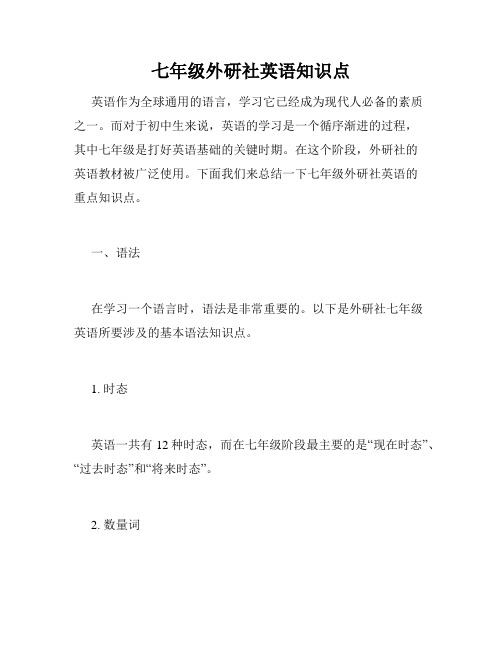
七年级外研社英语知识点英语作为全球通用的语言,学习它已经成为现代人必备的素质之一。
而对于初中生来说,英语的学习是一个循序渐进的过程,其中七年级是打好英语基础的关键时期。
在这个阶段,外研社的英语教材被广泛使用。
下面我们来总结一下七年级外研社英语的重点知识点。
一、语法在学习一个语言时,语法是非常重要的。
以下是外研社七年级英语所要涉及的基本语法知识点。
1. 时态英语一共有12种时态,而在七年级阶段最主要的是“现在时态”、“过去时态”和“将来时态”。
2. 数量词数量词是用来表示数量的词语。
例如:“a few”,“a little”,“alot of” 等。
学生们需要了解这些词语的语法形式和用途等方面的知识。
3. 记住常用句型英语中有一些常用的句型,例如“be going to”,“had better”,“would like to”等。
学生们需要尽快地掌握这些句型,以便在日常交流中更加流利。
二、词汇词汇是语言学习的基础。
学生们需要花费大量的时间来学习和记忆七年级英语中的常用词汇。
1. 常用词汇掌握英语基础单词的拼写、读音和意思是非常重要的。
在七年级,学生会接触到一大批常用单词,如:animal,vegetable,fruit,country,city等。
2. 词组与单词类似,掌握一些常用的词组也是十分重要的。
如:go to school,at home,in the classroom等。
三、听力技巧提高听力水平是初中英语教学的重要目标之一。
外研社的英语教材中有很多听力材料,学生们需要注意以下几个方面。
1. 听清节奏英语节奏对于听力理解很重要。
在听力过程中,学生们需要注意耳朵对话语节奏的敏感度。
2. 熟悉常用口音英语中有不同的口音,接触越多就越能辨识并理解英语的不同口音。
学生们需要在日常生活中注意加强对英语发音的理解和辨识。
4. 注意语境学生在听力过程中需要注意句子的语境,把握主要信息。
不要被其它不必要的细节所干扰。
(完整word版)八年级上册英语外研版(新)各模块知识点归纳总结(全)文档,文档
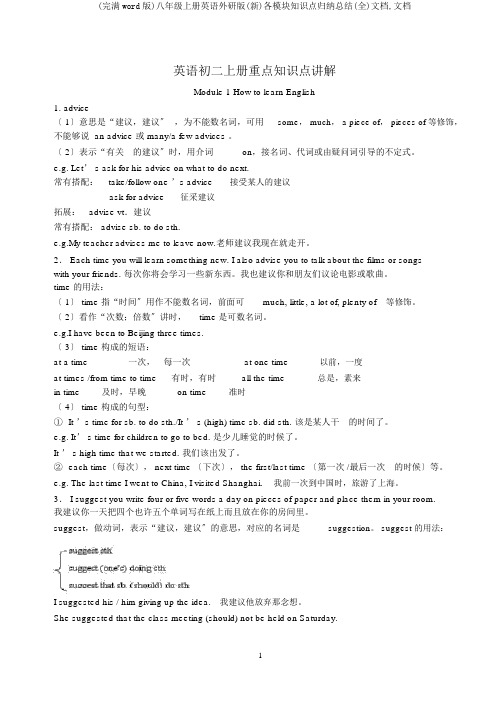
英语初二上册重点知识点讲解Module 1 How to learn English1. advice〔 1〕意思是“建议,建议〞,为不能数名词,可用some, much, a piece of, pieces of 等修饰,不能够说 an advice 或 many/a few advices 。
〔 2〕表示“有关的建议〞时,用介词on,接名词、代词或由疑问词引导的不定式。
e.g. Let’ s ask for his advice on what to do next.常有搭配:take/follow one ’s advice接受某人的建议ask for advice征采建议拓展:advise vt.建议常有搭配: advise sb. to do sth.e.g.My teacher advises me to leave now.老师建议我现在就走开。
2. Each time you will learn something new. I also advise you to talk about the films or songswith your friends. 每次你将会学习一些新东西。
我也建议你和朋友们议论电影或歌曲。
time 的用法:〔 1〕 time 指“时间〞用作不能数名词,前面可much, little, a lot of, plenty of等修饰。
〔 2〕看作“次数;倍数〞讲时,time 是可数名词。
e.g.I have been to Beijing three times.〔 3〕 time 构成的短语:at a time一次,每一次at one time以前,一度at times /from time to time有时,有时all the time总是,素来in time及时,早晚on time准时〔 4〕 time 构成的句型:①It ’s time for sb. to do sth./It ’ s (high) time sb. did sth. 该是某人干的时间了。
(完整版)初中英语外研版教材目录与知识点,推荐文档
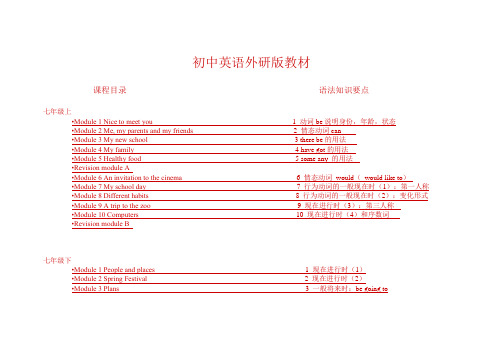
•Revision module A
•Module 6 An invitation to the cinema6情态动词would(would like to)
•Module 7 My school day7行为动词的一般现在时(1):第一人称
•Module 6 The Olympic adventure6形容词比较级和副词
•Revision module A
•Module 7 Planes, boats and trains7形容词和副词的最高级
•Module 8 My past life8一般过去式:be动词
•Module 9 Story time9一般过去式:实意动词的变化形式
•Module 4 Great inventions4现在完成和情态动词的被动
•Module 5 Museums5合成词构成法
•Module 6 Save our world6前缀,后缀构词法
•Revision module A
•Module 7 Australia7 that引导的定语从句
•Module 8 Photos8 which who引导的定语从句
•Module 10 Lao She''s Teahouse10动词不定式和双宾语
•Module 11 The weather11情态动词may/might动词不定式做主语
•Module 12 Traditional life12情态动词must, can
•Revision module B
八年级下
•Module 10 Life history10一般过去式:行为动词,疑问,否定形式
(完整版)外研版七年级英语上册全部知识点

七年级(上)Module1 My classmates1.系动词 be 的用法:am 用于第一人称 I 后 ; is 用于第三人称单数后 ;are 用于第二人称 you 及各种人称复数后。
口诀: I 是 am you 是 are is 用于 he, she, it,复数形式全用 are 。
2.陈述句变一般疑问句的句式:(1) be+主语 +...... eg: Are you a student? (2)情态动词( can)+ 主语 + 动词原形 +⋯⋯eg: Can you speak English?(3)助动词(do, does, did)+ 主语 + 动词原形 +......Eg: Do you like English?3. 代词( 1)人称代词:you you he she it they 主格: I we(做主语 )us you you him her it them 宾格: me( 作宾语 /表语 )( 2)物主代词:my our your your形容词性物主代词:his her its their (做定语 )名词性物主代词: mine ours yours yours hishers its theirs (作定语以外成分 )名词性物主代词 =形容词性物主代词 +名词 eg:mine = my book语言点解析1.Chinese n. 汉语;中国人 adj. 中国的,中国人的(1)作“语文,汉语”讲时,为不可数名词。
作“中国人”讲时,为可数名词,单复数形式相同。
Eg: He can speak a little English.We are all Chinese. 我们都是中国人。
(2)作为“中国的,中国人的” 讲时,为形容词。
I’m a Chinese student. 我是一名中国的学生。
2. What about/ How about⋯的用法(1)What about you = How about you 用来询问对方或第三者对前面所讨论话题的看法。
最新外研版七年级英语上册各单元知识点汇总(全册)
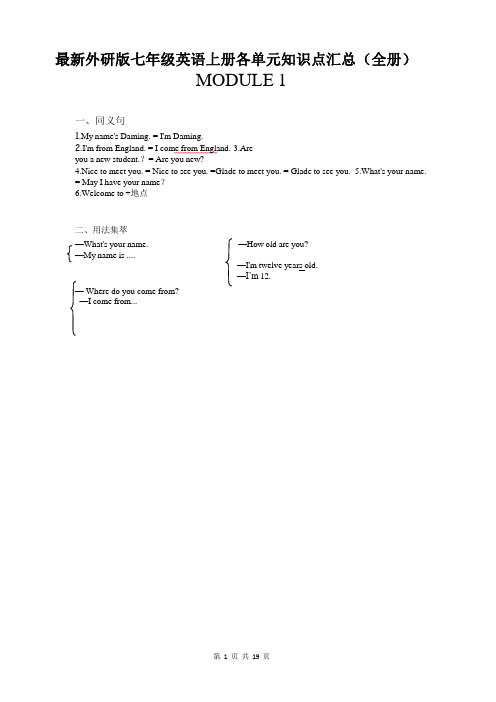
最新外研版七年级英语上册各单元知识点汇总(全册)MODULE1一、同义句1. M yname'sDaming.=I'mDaming.2. I 'mfromEngland.=IcomefromEngland.3.Areyouanewstude nt.?=Areyounew?4.Nicetomeet you.=Nicetoseeyou.=Gladetomeetyou.=Gladetoseeyou.5.What'syourname.=MayIhaveyourname ? 6.Welcometo+地点二、用法集萃 —What'syourname. —Howoldareyou? —Mynameis....—Wheredoyoucomefrom? —Icomefrom...—I'mtwelveyearsold. —I‟m 12.—Whereareyoufrom? —What classareyouin? —I'mfrom...—I'm inClassOne,GradeOne.—Whatabout ...?—Whataboutdoing...?=Howaboutdoing...?With 和andJimandLilygotothebank.(and 表并列) JimwithLily goestothebank.(with 是介词,和...一起,动词的形式要与with 前面的主语一致)三语法专项。
Be 动词用法口诀我用am 你用are,is 跟着他,她,它. 单数名词用is ,复数名词全用are. 变疑问,往前提,句末问号莫丢弃。
变否定,更容易,be 后not 莫忘记。
否定疑问任你变,句首大写莫迟疑。
MODULE2一、短语。
basketballf ootballrideabike\horseplaytennistabletennisth epianospeakEnglish\Japanese\Chinese sing(asong)s wimaphoto\pictureofmyfamilyauniversityan office二.句子(询问职业)twofactoriescitie s universitiess ecretariesWhatdoesyour...do?=Whatis\areyou...'sjob?=Whatisyour...?He\Sheisa... They're...三.语法感叹句1.What 引导的感叹句(修饰名词):What+(a\an )+形容词+名词+(主语+谓语)!Whata bigschoolitis!好大的学校啊!Whatatallboyhe is!他好高啊!Whatheavyrain!好大的雨!2.How引导的感叹句(修饰形容词或副词):How+形容词或副词+主语+谓语!How tallheis! 他好高啊!Howfastheruns!他跑地好快!代词(分类参照笔记)人称代词:代指人或物名称的词。
外研版初中英语各册知识点(外研版)

外研版初中英语各册知识点(外研版)初一上册各模块知识点及考试重点名词所所有格:⑴表示有生命的名词的所有格其单数形式是加's, students' rooms, father'sshoes 。
(2). 如复数结尾不是 s 的仍加's,如: Children's Day 。
(3). 在表示时间、距离、长度、重量、价格、世界、国家等名词的所有格要用's,例如:a twenty minutes' walk ,ten miles' journey ,a boat's length ,two pounds'weight, ten dollars' worth 。
(4). 无生命名词的所有格则必须用of 结构,例如:a map of China ,the end of thisterm , the capital of our country, the color of the flowers。
特殊情况:the key to the door/ the answer to the questionthe ticket for the concert(5). 双重所有格,例如: a friend of my father's 。
【注意】如果两个名词并列,并且分别有's,则表示“分别有”,例如:John's and Mary's rooms (约翰和玛丽各有一间,共两间);Tom's and Mary's bikes(两人各自的自行车)。
两个名词并列,只有一个's,则表示“共有”,例如:John and Mary's room (约翰和玛丽共有一间);Tom and Mary's mother (即 Tom 与 Mary 是兄妹)。
名词复数的不规则变化单复数通同形:人们说汉语和日语,瑞士人喜欢绵羊、鹿和雨fish、sheep、deer、people、Chinese、English不规则变化:男女孩子的脚,踩住老鼠的牙Women 、 men、feet、mice、teeth1、 would 的用法①Would you like to do sth?你愿意干某事吗?提出建议邀请,如果同意,用YES ,I’d love to./all right /A good idea.如果拒绝,也要客气的回绝。
外研版初三英语语法知识总结
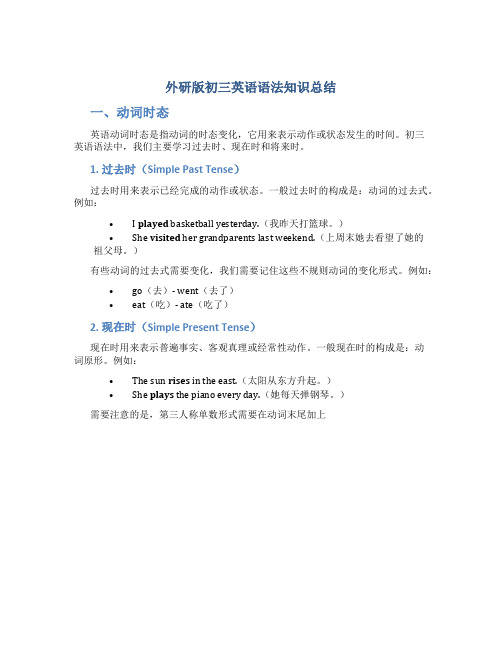
外研版初三英语语法知识总结
一、动词时态
英语动词时态是指动词的时态变化,它用来表示动作或状态发生的时间。
初三
英语语法中,我们主要学习过去时、现在时和将来时。
1. 过去时(Simple Past Tense)
过去时用来表示已经完成的动作或状态。
一般过去时的构成是:动词的过去式。
例如:
•I played basketball yesterday.(我昨天打篮球。
)
•She visited her grandparents last weekend.(上周末她去看望了她的祖父母。
)
有些动词的过去式需要变化,我们需要记住这些不规则动词的变化形式。
例如:
•go(去)- went(去了)
•eat(吃)- ate(吃了)
2. 现在时(Simple Present Tense)
现在时用来表示普遍事实、客观真理或经常性动作。
一般现在时的构成是:动
词原形。
例如:
•The sun rises in the east.(太阳从东方升起。
)
•She plays the piano every day.(她每天弹钢琴。
)
需要注意的是,第三人称单数形式需要在动词末尾加上。
初一英语外研版知识点
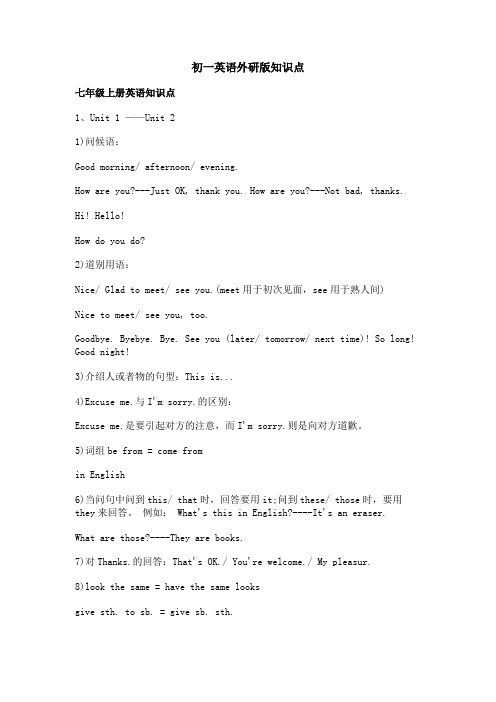
初一英语外研版知识点七年级上册英语知识点1、Unit 1 ——Unit 21)问候语:Good morning/ afternoon/ evening.How are you?---Just OK, thank you. How are you?---Not bad, thanks.Hi! Hello!How do you do?2)道别用语:Nice/ Glad to meet/ see you.(meet用于初次见面,see用于熟人间)Nice to meet/ see you, too.Goodbye. Byebye. Bye. See you (later/ tomorrow/ next time)! So long! Good night!3)介绍人或者物的句型:This is...4)Excuse me.与I'm sorry.的区别:Excuse me.是要引起对方的注意,而I'm sorry.则是向对方道歉。
5)词组be from = come fromin English6)当问句中问到this/ that时,回答要用it;问到these/ those时,要用they来回答。
例如: What's this in English?----It's an eraser.What are those?----They are books.7)对Thanks.的回答:That's OK./ You're welcome./ My pleasur.8)look the same = have the same looksgive sth. to sb. = give sb. sth.be like = look likein the tree/ on the tree (树上结的、长出来的用on,否则用in)in red(穿着红色的衣服)in the desk(在空间范围之内)in English(用英语)help sb. do sth.初一年级英语下册复习资料基数词的部分用法1、表顺序。
(2020年整理)外研版初中英语知识点汇总.doc
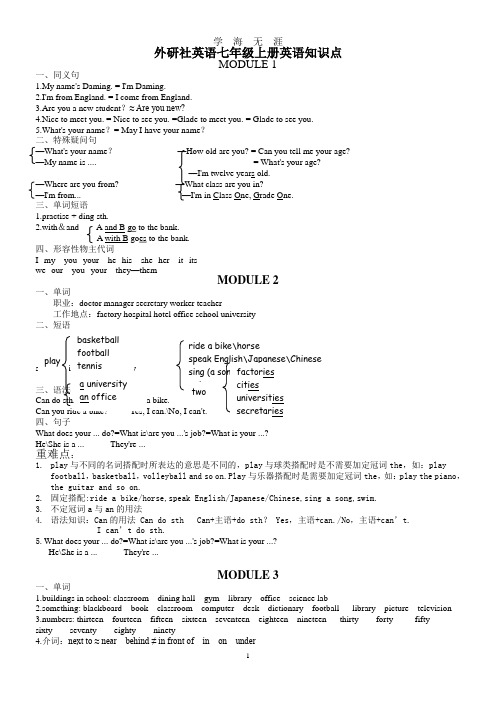
学 海 无 涯 外研社英语七年级上册英语知识点 MODULE 1一、同义句1.My name's Daming. = I'm Daming.2.I'm from England. = I come from England.3.Are you a new student ?≈ Are you new?4.Nice to meet you. = Nice to see you. =Glade to meet you. = Glade to see you.5.What's your name ?= May I have your name ?二、特殊疑问句 —What's your name ? —How old are you? = Can you tell me your age?—My name is ....= What's your age?—I'm twelve years old.—Where are you from? —What class are you in?—I'm from... —I'm in Class One, Grade One.三、单词短语1.practise + ding sth.2.with &and A and B go to the bank.A withB goes to the bank.四、形容性物主代词I--my you--your he--his she--her it--itswe--our you--your they —them MODULE 2一、单词职业:doctor manager secretary worker teacher工作地点:factory hospital hotel office school university四、句子What does your ... do?=What is\are you ...'s job?=What is your ...?He\She is a ... They're ... 重难点:1. play 与不同的名词搭配时所表达的意思是不同的,play 与球类搭配时是不需要加定冠词the ,如:play football ,basketball ,volleyball and so on.Play 与乐器搭配时是需要加定冠词the ,如:play the piano ,the guitar and so on.2. 固定搭配:ride a bike/horse,speak English/Japanese/Chinese,sing a song,swim.3. 不定冠词a 与an 的用法4. 语法知识:Can 的用法 Can do sth Can+主语+do sth ? Yes ,主语+can./No ,主语+can ’t. I can ’t do sth.5. What does your ... do?=What is\are you ...'s job?=What is your ...?He\She is a ... They're ...MODULE 3一、单词1.buildings in school: classroom dining hall gym library office science lab2.something: blackboard book classroom computer desk dictionary football library picture television3.numbers: thirteen fourteen fifteen sixteen seventeen eighteen nineteen thirty forty fifty sixty seventy eighty ninety4.介词:next to ≈ near behind ≠ in front of in on under5.in front of:在......前面in the front of:在......里面的前面6.right 正确的≠wrong右边的≠left二、语音er 、or 、ur 发/ə/三、语法(There be)----Are there any school offices?----Yes, there are. There are some offices. ----Is there a computer on Miss Li's desk? ----No, there isn't.注意:1.就近原则:There is some meat and two apple on the desk.2.名词所有格:Miss Li's herLily and Lucy's 两人共有的 eg: Lily and Lucy's father.Lily's and Lucy's 两人各有的 Lily's and Lucy's fathers. 重难点:1.重要单词: classroom dining hall gym library office science lab blackboard book classroom computer desk dictionary football library2.介词的用法: next to ≈ near behind ≠ in front of in on under3.in front of 与 in the front of 的区别4.语法知识: ----Are there any school offices?----Yes, there are. There are some offices. ----Is there a computer on Miss Li's desk? ----No, there isn't.就近原则:5.名词所有格: MODULE 4一、family members:aunt uncle grandma grandmother grandpa grandfather mother father mum dad sister brother二、短语句型Thank you for your email. your help. helping me. asking me. Make a family tree for your family.----There are four. There are my mum and dad, my sister and me.----Have you got an aunt?/any .....?----Yes,I have./No,I haven't.选择疑问句)or 的用法:① 或; ② 并列否定:I don't like swimming or dancing. :1..重要短语:Thank you for doing sth./Thanks for doing sth.3.have got 的用法4.重难点: or 的用法:① 或; ② 并列否定:I don't like swimming or dancing. MODULE 5-6一、单词1. orange 橙汁 have some orange [U ]橙色 the oranges are orange [C ]橙子 This is an orange [C ]2.Kind 善良 He is very kind.种类=type a kind / type of fruit two kinds /types of fruits3. gym: 不受天气影响的室内体育馆、健身房或运动馆2.表示经常性或习惯性的动作。
初中外研英语语法知识点总结
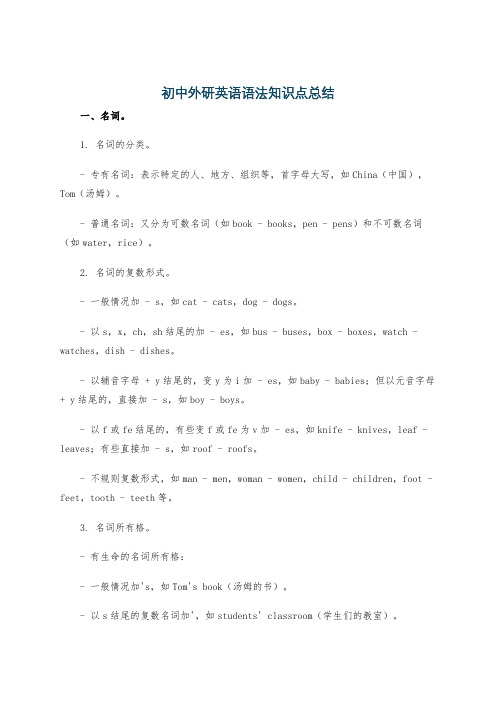
初中外研英语语法知识点总结一、名词。
1. 名词的分类。
- 专有名词:表示特定的人、地方、组织等,首字母大写,如China(中国),Tom(汤姆)。
- 普通名词:又分为可数名词(如book - books,pen - pens)和不可数名词(如water,rice)。
2. 名词的复数形式。
- 一般情况加 - s,如cat - cats,dog - dogs。
- 以s,x,ch,sh结尾的加 - es,如bus - buses,box - boxes,watch - watches,dish - dishes。
- 以辅音字母 + y结尾的,变y为i加 - es,如baby - babies;但以元音字母+ y结尾的,直接加 - s,如boy - boys。
- 以f或fe结尾的,有些变f或fe为v加 - es,如knife - knives,leaf - leaves;有些直接加 - s,如roof - roofs。
- 不规则复数形式,如man - men,woman - women,child - children,foot - feet,tooth - teeth等。
3. 名词所有格。
- 有生命的名词所有格:- 一般情况加's,如Tom's book(汤姆的书)。
- 以s结尾的复数名词加',如students' classroom(学生们的教室)。
- 表示两者或多者共有时,最后一个名词加's,如Tom and Jerry's room(汤姆和杰瑞的房间);表示各自所有时,每个名词都加's,如Tom's and Jerry's toys (汤姆的和杰瑞的玩具)。
- 无生命的名词所有格用“of + 名词”结构,如the window of the room(房间的窗户)。
二、冠词。
1. 不定冠词a/an。
- a用于以辅音音素开头的单词前,如a book;an用于以元音音素开头的单词前,如an apple。
- 1、下载文档前请自行甄别文档内容的完整性,平台不提供额外的编辑、内容补充、找答案等附加服务。
- 2、"仅部分预览"的文档,不可在线预览部分如存在完整性等问题,可反馈申请退款(可完整预览的文档不适用该条件!)。
- 3、如文档侵犯您的权益,请联系客服反馈,我们会尽快为您处理(人工客服工作时间:9:00-18:30)。
学 海 无 涯 外研社英语七年级上册英语知识点 MODULE 1一、同义句1.My name's Daming. = I'm Daming.2.I'm from England. = I come from England.3.Are you a new student ?≈ Are you new?4.Nice to meet you. = Nice to see you. =Glade to meet you. = Glade to see you.5.What's your name ?= May I have your name ?二、特殊疑问句 —What's your name ? —How old are you? = Can you tell me your age?—My name is ....= What's your age?—I'm twelve years old.—Where are you from? —What class are you in?—I'm from... —I'm in Class One, Grade One.三、单词短语1.practise + ding sth.2.with &and A and B go to the bank.A withB goes to the bank.四、形容性物主代词I--my you--your he--his she--her it--itswe--our you--your they —them MODULE 2一、单词职业:doctor manager secretary worker teacher工作地点:factory hospital hotel office school university四、句子What does your ... do?=What is\are you ...'s job?=What is your ...?He\She is a ... They're ... 重难点:1. play 与不同的名词搭配时所表达的意思是不同的,play 与球类搭配时是不需要加定冠词the ,如:play football ,basketball ,volleyball and so on.Play 与乐器搭配时是需要加定冠词the ,如:play the piano ,the guitar and so on.2. 固定搭配:ride a bike/horse,speak English/Japanese/Chinese,sing a song,swim.3. 不定冠词a 与an 的用法4. 语法知识:Can 的用法 Can do sth Can+主语+do sth ? Yes ,主语+can./No ,主语+can ’t. I can ’t do sth.5. What does your ... do?=What is\are you ...'s job?=What is your ...?He\She is a ... They're ...MODULE 3一、单词1.buildings in school: classroom dining hall gym library office science lab2.something: blackboard book classroom computer desk dictionary football library picture television3.numbers: thirteen fourteen fifteen sixteen seventeen eighteen nineteen thirty forty fifty sixty seventy eighty ninety4.介词:next to ≈ near behind ≠ in front of in on under5.in front of:在......前面in the front of:在......里面的前面6.right 正确的≠wrong右边的≠left二、语音er 、or 、ur 发/ə/三、语法(There be)----Are there any school offices?----Yes, there are. There are some offices. ----Is there a computer on Miss Li's desk? ----No, there isn't.注意:1.就近原则:There is some meat and two apple on the desk.2.名词所有格:Miss Li's herLily and Lucy's 两人共有的 eg: Lily and Lucy's father.Lily's and Lucy's 两人各有的 Lily's and Lucy's fathers. 重难点:1.重要单词: classroom dining hall gym library office science lab blackboard book classroom computer desk dictionary football library2.介词的用法: next to ≈ near behind ≠ in front of in on under3.in front of 与 in the front of 的区别4.语法知识: ----Are there any school offices?----Yes, there are. There are some offices. ----Is there a computer on Miss Li's desk? ----No, there isn't.就近原则:5.名词所有格: MODULE 4一、family members:aunt uncle grandma grandmother grandpa grandfather mother father mum dad sister brother二、短语句型Thank you for your email. your help. helping me. asking me. Make a family tree for your family.----There are four. There are my mum and dad, my sister and me.----Have you got an aunt?/any .....?----Yes,I have./No,I haven't.选择疑问句)or 的用法:① 或; ② 并列否定:I don't like swimming or dancing. :1..重要短语:Thank you for doing sth./Thanks for doing sth.3.have got 的用法4.重难点: or 的用法:① 或; ② 并列否定:I don't like swimming or dancing. MODULE 5-6一、单词1. orange 橙汁 have some orange [U ]橙色 the oranges are orange [C ]橙子 This is an orange [C ]2.Kind 善良 He is very kind.种类=type a kind / type of fruit two kinds /types of fruits3. gym: 不受天气影响的室内体育馆、健身房或运动馆2.表示经常性或习惯性的动作。
eg:I get up at six every day.usually 、always 、often 、never + n. be + usually 、always 、often 、never 3.表示客观现实。
eg :The earth goes around the sun.【No. 2】一般现在时的构成1. be 动词:主语+be(am,is,are)+其它。
eg :I am a boy.2.行为动词:主语+行为动词(+其它)。
eg :We study English.【No. 3】否定句1. be 动词的变化:主语+ be + not +其它。
eg :He is not a worker.2.行为动词的变化:主语+ don't( doesn't ) +V 原形(+其它)。
eg :I don't like bread. 重难点:1. 重要短语:talk aboutsth/talk with sb/talk to sb.2. 时间的表达(直读法与逆读法)3. 一般现在时的概念与用法1(详见知识点总结) MODULE 8一、短语句型be different from ask sb. (not) to do sth. have a habit of ding sth.get sth. from sb. by her favourite singers a box of candies/chocolateson television wear silk shirts send/give sth. to sb. 【No. 1③频度副词用法 重难点:一般现在时的概念与用法2(详见知识点总结) 形容词性物主代词的用法 MODULE 9一、单词① Names of the animalscamel elephant giraffe kangaroo monkey--monkeysSnake panda lion zebra polar bear wolf--wolvesAsia Africa Europe Oceania America North/South AmericaAsian African European Oceania Americathe Arctic-Yes. I am. / No, I'm not.3.行为动词的变化:Do( Does ) +主语+动词原形+其它。
eg:- Do you often play football? - Yes, I do. / No, I don't.重难点:1.重要单词: camel elephant giraffe kangaroo monkey--monkeysSnake panda lion zebra polar bear wolf--wolves2.重要短语:5 thousand与thousands of +名词的区别3.行为动词的一般疑问句的形式变化::Do( Does ) +主语+动词原形+其它。
